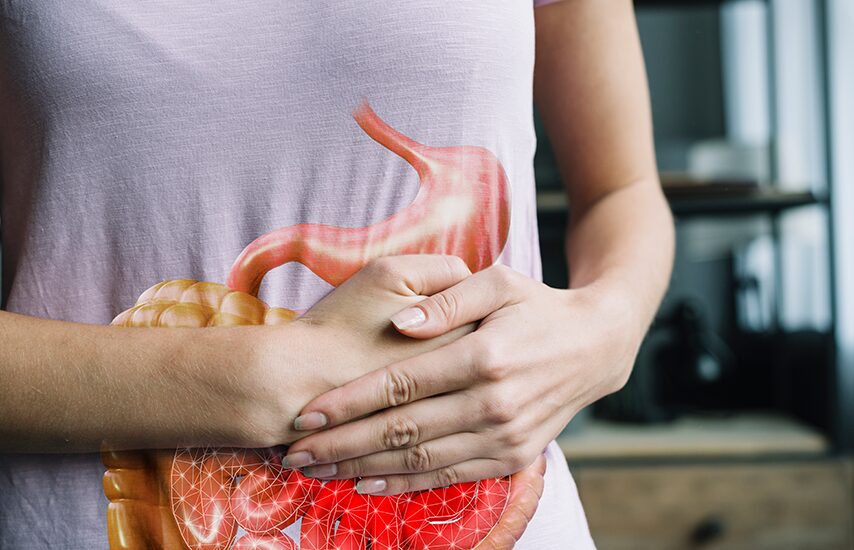What Is Gut Rot? Your Guide to Soothing Digestive Discomfort

The term “gut rot” evokes discomfort and unease. If you’ve ever experienced that burning sensation, bloating, or indigestion in your stomach, you’re not alone. In this article, we’ll unravel the mystery of what is gut rot, exploring its causes, symptoms, and effective ways to find relief.
Whether you’ve encountered gut rot after a night of indulgence or are struggling with chronic digestive discomfort, we’re here to provide you with practical insights and empathetic guidance.
Causes of Gut Rot
Gut rot can be triggered by various factors, leaving you with uncomfortable stomach pain. Understanding these causes is the first step towards finding relief and preventing future episodes. Here are some common factors contributing to gut rot:
- Alcohol consumption. Excessive alcohol intake can irritate the gut lining, leading to heartburn, severe stomach pain, and discomfort, often referred to as “gut rot after drinking.”
- Unhealthy diet. Consuming a diet high in processed foods, low in dietary fiber, or rich in sugars can disrupt your digestive system, increasing the likelihood of gut rot.
- Stress. High stress levels can lead to the overproduction of stomach acid, intensifying gut rot symptoms.
- Food sensitivities. Some individuals may be sensitive to specific foods, such as spicy or acidic dishes, which can trigger episodes of gut rot and stomach aches.
- Gut microbiome. An imbalanced gut microbiota, characterized by an overgrowth of harmful bacteria and a deficiency of beneficial ones, can contribute to gut rot.
By understanding these underlying causes, you can take steps to alleviate gut rot and improve your digestive well-being.
In the following sections, we’ll delve deeper into practical ways to find relief, prevent future episodes, and support your gut health.
How to Relieve Gut Rot

Now that we’ve explored the causes of gut rot, it’s essential to discover effective ways to relieve and soothe the discomfort.
Here are practical steps you can take to alleviate gut rot:
- Antacids for immediate relief. When you experience the discomfort of gut rot, over-the-counter antacids can provide quick relief by neutralizing excess stomach acid. These can be particularly helpful after a night of heavy drinking or consuming trigger foods.
- Ginger tea for natural soothing. Ginger is renowned for its natural anti-inflammatory properties and its ability to calm digestive discomfort. Enjoying a warm cup of ginger tea can ease stomach pain associated with gut rot.
- Identify and avoid trigger foods. Pay attention to the foods that seem to aggravate your gut rot symptoms. Spicy, acidic, or greasy foods are common culprits. Limit your consumption of these trigger foods to reduce the likelihood of stomach pain.
- Stress management. Stress can exacerbate gut rot symptoms by increasing stomach acid production. It can lead to an upset stomach, exacerbating digestive discomfort and stomach pains. Incorporate stress-reduction techniques into your daily routine, such as meditation, deep breathing exercises, or yoga.
- Probiotic support. Introducing probiotics into your regimen can be a valuable step in improving gut health. Bioma, our synbiotic supplement, contains a blend of gut bacteria-supporting ingredients like Xylooligosaccharide (XOS) prebiotic, thermogenic probiotics, and tributyrin postbiotic. These components work together to promote a balanced gut microbiome, which can help alleviate gut rot and support overall well-being by protecting your gut lining.
By incorporating these strategies, you can find relief from gut rot discomfort and work towards maintaining a healthier digestive system.
In the next sections, we’ll explore prevention techniques and provide recommendations for a gut-healthy lifestyle. Stay tuned for more practical insights on managing gut rot and enhancing your overall well-being.
Foods to Soothe Indigestion

When gut rot strikes, reaching for the right foods can make a significant difference in easing your discomfort. These foods can help calm your digestive system and provide relief from symptoms like stomach pain, bloating, and indigestion.
Let’s explore a list of digestive-friendly options to include in your diet:
- Bananas. Bananas are gentle on the stomach and can help neutralize excess stomach acid. They are also a good source of potassium, which can aid in overall digestive health.
- Oatmeal. Oatmeal is rich in soluble fiber, which can absorb excess stomach acid and promote smoother digestion. It’s a great choice for those looking to manage gut rot symptoms.
- Ginger. Ginger, whether in tea or freshly grated, has natural anti-inflammatory properties that can soothe an upset stomach and reduce inflammation in the gastrointestinal tract.
- Yogurt. Yogurt contains beneficial probiotics, which can support a healthy gut microbiome. Opt for plain, unsweetened yogurt to avoid added sugars that can exacerbate gut rot symptoms.
- Rice. Plain white rice is easy to digest and can help alleviate gut rot discomfort. It can also serve as a bland base for other easily digestible foods.
- Herbal teas. Herbal teas like peppermint or chamomile can help relax the digestive tract and reduce stomach pain associated with gut rot.
- Papaya. Papaya contains enzymes (papain) that aid in digestion and can be particularly helpful in reducing bloating and discomfort.
Incorporating these foods into your diet when experiencing gut rot can provide relief and promote better digestive well-being. Also, it can help rebuild a better intestinal lining, helping good bacteria to thrive and add to a better immune system.
Remember that a balanced diet rich in these options, coupled with the right lifestyle choices, can help prevent future episodes of digestive discomfort.
Lifestyle Recommendations for Gut Health

Maintaining a healthy gut and preventing gut rot involves more than just dietary choices. Your lifestyle plays a significant role in the well-being of your digestive system.
It’s essential to be aware of the potential consequences of an unhealthy lifestyle, as it can contribute to issues like leaky gut, gastrointestinal symptoms, and chronic inflammation. For individuals dealing with the challenges of leaky gut syndrome, making sustained lifestyle changes is paramount.
Let’s explore some essential lifestyle recommendations that can contribute to optimal digestive and gut health:
- Stay hydrated. Adequate water intake is crucial for proper digestion. It helps soften stool, prevent constipation, and support the movement of food through your digestive tract.
- Regular exercise. Engaging in regular physical activity not only helps manage stress but also promotes healthy digestion. Aim for at least 30 minutes of moderate exercise daily.
- Limit alcohol consumption. As mentioned earlier, excessive alcohol can irritate the stomach lining and disrupt gut health. Moderation is key to avoiding gut rot after drinking.
- Manage stress. Chronic stress can wreak havoc on your digestive system. Stress reduction techniques can significantly benefit individuals managing digestive sensitivities like irritable bowel syndrome. Incorporate stress-reduction techniques such as meditation, deep breathing exercises, or mindfulness practices into your daily routine.
- Probiotic supplements. In addition to dietary sources of probiotics, you can consider probiotic supplements to further support a balanced gut microbiome. These supplements can provide a concentrated dose of beneficial bacteria.
- Fiber intake. Ensure you get enough dietary fiber from fruits, vegetables, and whole grains. Fiber supports regular bowel movements and contributes to overall gut health. A diet rich in fiber also promotes the health of the intestinal lining, contributing to better digestion.
- Limit processed foods. Processed foods are often loaded with additives, preservatives, and unhealthy fats that can disrupt your digestive system. Opt for whole, unprocessed foods whenever possible.
- Adequate sleep. Prioritize getting 7-9 hours of quality sleep per night. Proper rest is essential for the body to repair and maintain a healthy digestive system.
- Regular health check-ups. Conditions such as inflammatory bowel disease, celiac disease, and ulcerative colitis can affect digestive health. Regular check-ups with your healthcare provider can help detect and manage these issues.
By incorporating these lifestyle recommendations into your daily routine, you can nurture your digestive system and maintain optimal gut health. Adopting a gut-healthy lifestyle can aid in the journey to heal leaky gut and achieve lasting digestive comfort.

A holistic approach to well-being, encompassing diet, exercise, and stress management, is key to preventing gut rot and promoting a healthier digestive experience.
Conclusion
In conclusion, understanding and managing gut rot is essential for your digestive comfort and overall well-being. By exploring its causes, symptoms, and practical solutions, you can take control of your digestive health.
It’s important to remember that a leaky gut, characterized by increased intestinal permeability, can contribute to digestive discomfort, and adopting a gut-healthy lifestyle can help mitigate these issues.
While gut rot may occasionally lead to upset stomach and stomach pains, incorporating dietary choices like ginger and bananas can provide relief. Additionally, addressing food sensitivities and opting for a diet rich in fiber and probiotics can support your digestive system and reduce the risk of chronic inflammation and conditions like irritable bowel syndrome.
Remember that maintaining a balanced lifestyle, managing stress, and seeking professional guidance when needed can play a crucial role in achieving and sustaining optimal digestive and gut health.
Your digestive system is the gateway to your overall well-being, and taking care of it can help you avoid not only gut rot but also other potential health concerns like heart disease. So, embark on the path to digestive wellness, and your body will thank you for it!
References
Marston, A. (1999). Gut rot. The Lancet, 353(9167), 1875-1877.
Farag, M. A., von Bergen, M., Shao, P., & Güven, E. Ç. (2023). How do Food and drugs interact with gut microbiota? Toward better or worse health outcomes. Journal of Advanced Research, 52, 1.
Plotnikoff, G., Weisberg, M. B., & LeBeau, S. (2013). Trust Your Gut: Get Lasting Healing from IBS and Other Chronic Digestive Problems Without Drugs. Conari Press.
Thompson, B. S. Indigestion and Its Management.
Related articles



